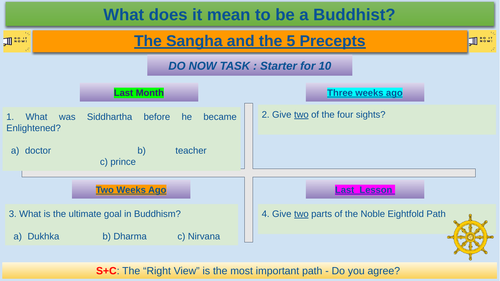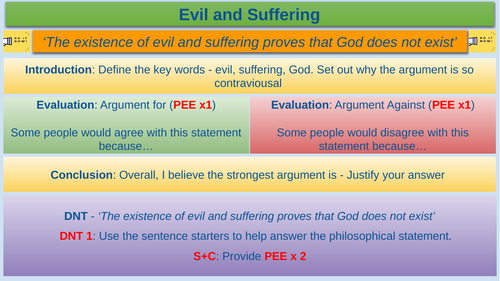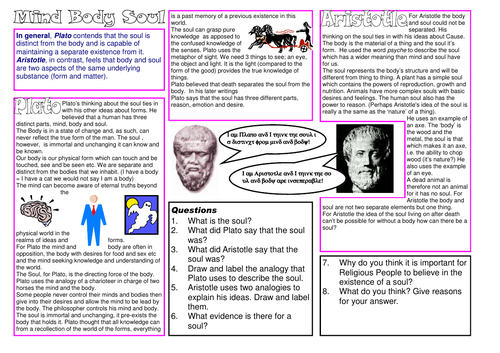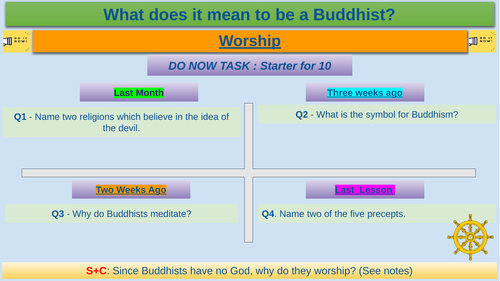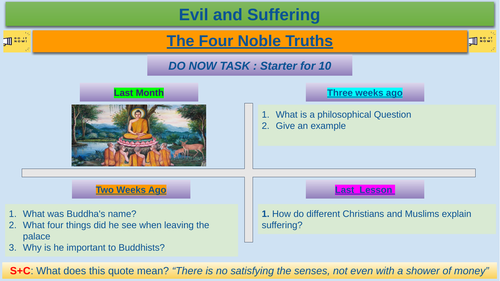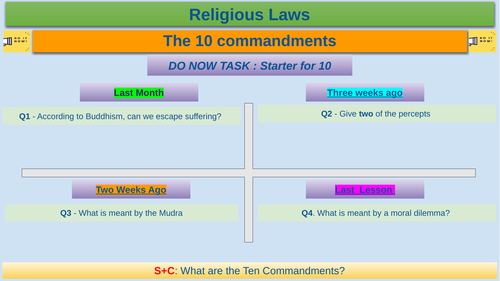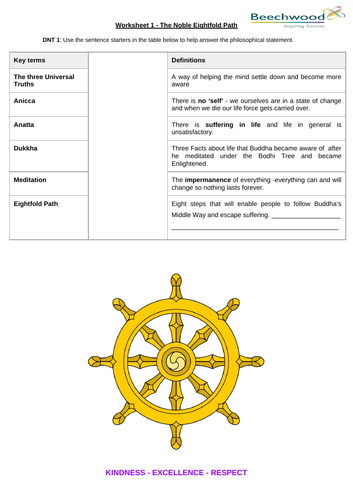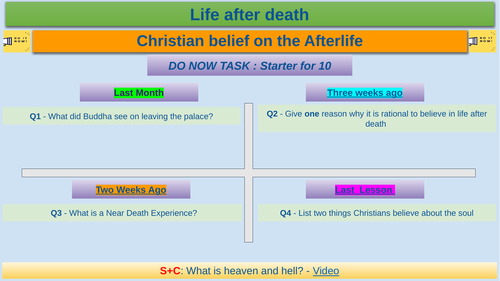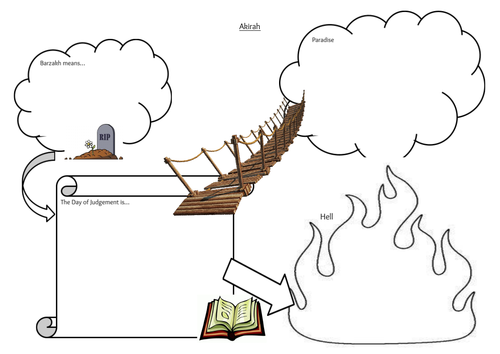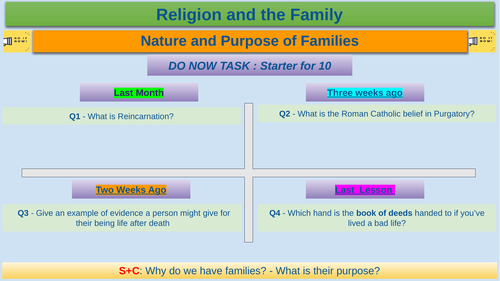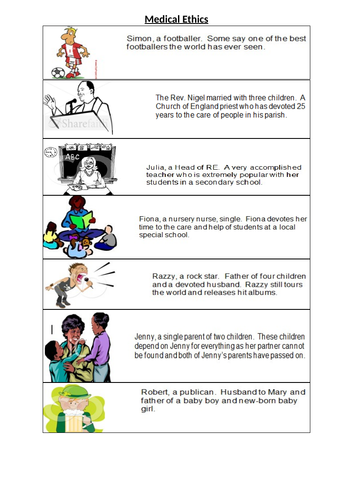
221Uploads
34k+Views
7k+Downloads
Religious education

Consequences and Victims of War - AQA - Religious Studies GCSE
Resource includes PowerPoint presention and differentiated worksheets for a 1 hour lesson, following the AQA specification.
Component 2: Thematic studies
Theme D
L1 - Forgiveness and Reconciliation
L2 - Pacifism and Peacekeeping
L3 - Violent Protests
L4 - Terrorism
L5- Consequences and Victims of War
L6 - Weapons of Mass Destruction and Nuclear Weapons
L7 - Holy War and Just War
L8 - Assessment
L9 - DiRT

Weapons of Mass Destruction and Nuclear Weapons - AQA - Religious Studies GCSE
Resource includes PowerPoint presention and differentiated worksheets for a 1 hour lesson, following the AQA specification.
Component 2: Thematic studies
Theme D
L1 - Forgiveness and Reconciliation
L2 - Pacifism and Peacekeeping
L3 - Violent Protests
L4 - Terrorism
L5- Consequences and Victims of War
L6 - Weapons of Mass Destruction and Nuclear Weapons
L7 - Holy War and Just War
L8 - Assessment
L9 - DiRT

Reasons for Crime - AQA - Religious Studies GCSE
Resource includes PowerPoint presention and differentiated worksheets for a 1 hour lesson, following the AQA specification.
Component 2: Thematic studies
Theme E
L1 - Good and Evil Intentions
L2 - Different types of crime
L3 - Reasons for Crime - Part 1
L4 - Reasons for Crime - Part 2
L5 - Aims of Punishment
L6 - Types of Punishment
L7 - Religious attitudes towards Types of Punishment
L8 - Religious attitudes to Fogiveness

Good and Evil Intentions - AQA - Religious Studies GCSE
Resource includes PowerPoint presention and differentiated worksheets for a 1 hour lesson, following the AQA specification.
Component 2: Thematic studies
Theme E
**L1 - Good and Evil Intentions **
L2 - Different types of crime
L3 - Reasons for Crime - Part 1
L4 - Reasons for Crime - Part 2
L5 - Aims of Punishment
L6 - Types of Punishment
L7 - Religious attitudes towards Types of Punishment
L8 - Religious attitudes to Fogiveness

Different types of crimes - AQA - Religious Studies GCSE
Resource includes PowerPoint presention and differentiated worksheets for a 1 hour lesson, following the AQA specification.
Component 2: Thematic studies
Theme E
L1 - Good and Evil Intentions
L2 - Different types of crime
L3 - Reasons for Crime - Part 1
L4 - Reasons for Crime - Part 2
L5 - Aims of Punishment
L6 - Types of Punishment
L7 - Religious attitudes towards Types of Punishment
L8 - Religious attitudes to Fogiveness

Aims of Punishment - AQA - Religious Studies GCSE
Resource includes PowerPoint presention and differentiated worksheets for a 1 hour lesson, following the AQA specification.
Component 2: Thematic studies
Theme E
L1 - Good and Evil Intentions
L2 - Different types of crime
L3 - Reasons for Crime - Part 1
L4 - Reasons for Crime - Part 2
L5 - Aims of Punishment
L6 - Types of Punishment
L7 - Religious attitudes towards Types of Punishment
L8 - Religious attitudes to Fogiveness

The Sangha and the 5 Precepts
KS3 Philosophy and Ethics - Unit 1- Evil and Suffering
Students will be able to:
To identify the Five Precepts
To explain the day in a life of the Sangha
To evaluate the need for the Sangha to have additional moral codes
Feedback is welcome, please check out the rest of my lessons in the Science and Religion Scheme of Work!

Life After Death
KS3 Philosophy and Ethics - Unit 3 - Life after death?
Students will be able to:
To explore different beliefs on whether there is life after death
To analyse whether the belief in life after death affects the way believers live
To evaluate different beliefs in life after death against each other
Feedback is welcome, please check out the rest of my lessons in the Science and Religion Scheme of Work!

Evil and Suffering
KS3 Philosophy and Ethics - Unit 1- Evil and Suffering
Students will be able to:
To identify the different between moral and natural evil
To explore to explore the problem of evil and suffering
To evaluate attitudes towards the existence of evil and suffering
Feedback is welcome, please check out the rest of my lessons in the Science and Religion Scheme of Work!

The Soul
KS3 Philosophy and Ethics - Unit 2 - Religious Laws
Students will be able to:
To describe what is meant by the soul
To explore different beliefs about the soul
To evaluate these beliefs about the soul against each other
Feedback is welcome, please check out the rest of my lessons in the Science and Religion Scheme of Work!

Buddhists Worship
KS3 Philosophy and Ethics - Unit 1- Evil and Suffering
Students will be able to:
To describe different ways Buddhists worship.
To explain how and why Buddhists worship includingthe symbolism of mudras and statues of Buddha.
To evaluate why Buddhists worship when they don’t believe in God.
Feedback is welcome, please check out the rest of my lessons in the Science and Religion Scheme of Work!

The Four Noble Truths
KS3 Philosophy and Ethics - Unit 1- Evil and Suffering
Students will be able to:
To summerise the four noble Truths
To apply the Four Noble Truths to the issue of suffering
To analyse how Buddhist respond to the existence of evil and suffering
Feedback is welcome, please check out the rest of my lessons in the Science and Religion Scheme of Work!

The 10 commandments
KS3 Philosophy and Ethics - Unit 2 - Religious Laws
Students will be able to:
To identify the ten commandments
To explain how the ten commandments influence people today
To evaluate whether the Ten Commandments are still relevant today
Feedback is welcome, please check out the rest of my lessons in the Science and Religion Scheme of Work!

The Noble Eightfold Path
KS3 Philosophy and Ethics - Unit 1- Evil and Suffering
Students will be able to:
To identify the principles of the Noble Eightfold Path
To examine the relationship between The Noble Eightfold Path and the Threefold Way
To suggest how each of the ethical principles can end suffering and ultimately help someone achieve nirvana
Feedback is welcome, please check out the rest of my lessons in the Science and Religion Scheme of Work!

What is Morality?
KS3 Philosophy and Ethics - Unit 2 - Religious Laws
Students will be able to:
To define the following key terms; morality, ethics and moral issues
To examine where people get their morals from
To evaluate whether we need religious rules to do the right thing?
Feedback is welcome, please check out the rest of my lessons in the Science and Religion Scheme of Work!

Christian belief on the Afterlife
KS3 Philosophy and Ethics - Unit 3 - Life after death
Students will be able to:
To explain the Christians belief on the afterlife
To explore why Christians hold these beliefs
To evaluate how these beliefs influence Christians today
Feedback is welcome, please check out the rest of my lessons in the Science and Religion Scheme of Work!

Muslim belief on the Afterlife
KS3 Philosophy and Ethics - Unit 3 - Life after death
Students will be able to:
To explain the Muslim belief on the afterlife
To explore why Muslims hold these beliefs
To evaluate how these beliefs influence Muslims today
Feedback is welcome, please check out the rest of my lessons in the Science and Religion Scheme of Work!

Nature and Purpose of Families
KS3 Philosophy and Ethics - Unit 4 - Religion and the Family
Students will be able to:
To consider the nature of families in the 21st century.
To explore religious beliefs and teachings about the nature of families and the role of parents
To evaluate the nature and purpose of families in the 21st century.
Feedback is welcome, please check out the rest of my lessons in the Science and Religion Scheme of Work!

Marriage
KS3 Philosophy and Ethics - Unit 4 - Religion and the Family
Students will be able to:
To consider why people choose to get married
To explain different viewpoints on marriage
To evaluate whether marriage is still relevant today
Feedback is welcome, please check out the rest of my lessons in the Science and Religion Scheme of Work!

Sanctity of Life
KS3 Philosophy and Ethics - Unit 5 - Sanctity of Life
Students will be able to:
To describe what is meant by the term the sanctity of life
To explore why religions teaches that all life is special
To evaluate the impact this belief has on people today
Feedback is welcome, please check out the rest of my lessons in the Science and Religion Scheme of Work!







